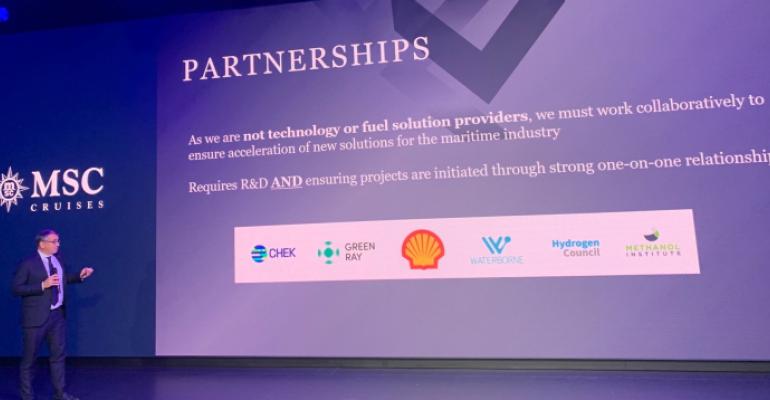‘We are talking about electrostatic exhaust filtering power, waste to energy and even potential nuclear energy,’ said Francioni. ‘Nobody wants to hear about that. But this is a technology that in the future may become viable for our decarbonisation strategy…’
Hydrogen: ‘Great. In theory’
From onboard MSC World Europa yesterday in Saint-Nazaire, before the handover of the ship at Chantiers de l'Atlantique, the SVP went on to discuss hydrogen as a future fuel, describing it as ‘Great. In theory.’
‘It can be used on all the types of fuel cells that we are developing… and potentially could be used in internal combustion engines,’ he said. ‘The engine manufacturers are working on projects for which we can have a mix between LNG and hydrogen and this will help us to progressively reduce emissions.’
Explora's fuel cells
MSC Group’s cruise division has committed to adding large liquid hydrogen tanks onboard two of its luxury brand vessels, Explora Journeys’ Explora V and Explora VI, to be built by Fincantieri, which will be able to supply the onboard fuel cell – ‘a very challenging project’ in terms of both technology and supply chain. 'Let's be honest, I think today we could use three kilos of green hydrogen per day… we will be able to take on the ship all the hydrogen energy produced onboard, [that is] produced in the world. The supply chain is still not there.’
A number of fuels being examined as the industry races to cut carbon emissions – hydrogen, ammonia and methanol among them – call for lower energy consumption, ‘so we need to reduce the energy to be able to adopt this fuel more easily,’ Francioni asserted.
Tackling methane slip
While combating methane slip is ‘probably the most advanced technology to develop,’ according to Francioni, steps are being taken in collaboration with Chantiers de l'Atlantique to find a solution.
'Methane slip is a challenge we’re trying to solve right now,’ shared Chantiers de l’Atlantique’s new building programme director, Henri Doyer. ‘Methane has a really high greenhouse effect, more than the CO2, so it reduces the effect of the dual LNG-powered system [used onboard MSC World Europa.]
‘We are introducing new solutions within the new generation engines,’ he continued, ‘[and] we will retrofit all the ships so we can reduce the non-burnt methane leaking out. The result will be really positive.’
Among the solutions is a new 150KWh fuel cell, with Doyer observing, ‘Fuel cells are a major contributor for the decarbonisation of cruise ships. [They have] 15-20% better performance than the fuel engine in powering the hotel, so you don’t have any methane slip.
‘This is the first time we’ve installed this type of fuel cell onboard a ship. It’s really sophisticated [and] innovative.’
6MW fuel cells will be installed on Explora V and Explora VI, which will have the potential capability to provide all the ships’ energy needs whilst in port.
Copyright © 2024. All rights reserved. Seatrade, a trading name of Informa Markets (UK) Limited.
Add Seatrade Cruise News to your Google News feed.  |

